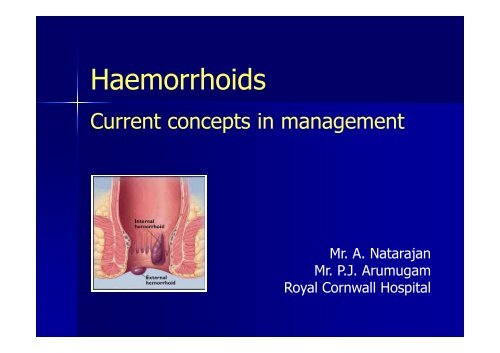Haemorrhoids - Colorectal Surgeon
Haemorrhoids - Colorectal Surgeon
Haemorrhoids - Colorectal Surgeon
You also want an ePaper? Increase the reach of your titles
YUMPU automatically turns print PDFs into web optimized ePapers that Google loves.
<strong>Haemorrhoids</strong><br />
Current concepts in management<br />
Mr. A. Natarajan<br />
Mr. P.J. Arumugam<br />
Royal Cornwall Hospital
Introduction<br />
<strong>Haemorrhoids</strong> are the normal angio angio-cavernous cavernous connective<br />
tissue cushions present in utero into adult life.<br />
‘<strong>Haemorrhoids</strong>’ usually relates to symptoms.<br />
Bleeding is arterial than venous.<br />
By the age of 50 = half the population.<br />
Treat only when symptomatic. depends on<br />
history<br />
symptoms<br />
findings<br />
associated conditions
Classification<br />
E I IE<br />
E<br />
Grade - I : bleeds<br />
Grade - II : bleed and prolapse<br />
spontaneous reduction.<br />
Grade - III : bleeds, prolapse<br />
manual reduction.<br />
Grade - IV : non reducible.<br />
Internal : above dentate line,<br />
columnar epi, painless<br />
External: below dentate line,<br />
squamous epi, innervated<br />
Interno-external
• 59 year old male.<br />
• Habitual constipation.<br />
• Intermittent bleeding per rectum 10/52<br />
• No loss of weight, app. No family history<br />
Abdominal examination: NAD<br />
Proctoscopy: G-II haemorrhoids.<br />
What next ?
• 35 year old male.<br />
• Bright red blood per rectum.<br />
•Fit and healthy<br />
Abdominal examination: NAD<br />
Proctoscopy: G-II haemorrhoids.<br />
What next ?
Investigation<br />
History, Examination.<br />
Rectal Examination, Proctoscopy.<br />
Sigmoidoscopy: Rigid, Flexible.<br />
Barium Enema.<br />
Colonoscopy.<br />
Flexible Sigmoidoscopy<br />
Ideal in one stop rectal bleed clinic. > 50yrs<br />
single FS screen (55-64) years is cost-effective<br />
could prevent about 5500 colorectal cancer<br />
cases and 3500 deaths in the UK each year<br />
Atkin WS.St. Mark’s. London 1993-2003<br />
1052 pts: rectal bleed. No complications<br />
Diagnostic yield:21.1% Cancer 1.2% Polyps 7.7.%<br />
Choi et al HKMJ 2003;9:171-4.
Differential Diagnosis<br />
Rectal polyps<br />
Solitary rectal ulcer<br />
Anal canal cancer<br />
Rectal tumour<br />
Colitis<br />
Prolapse<br />
Peri Peri-anal anal Crohn’s
Treatment<br />
Medical therapy.<br />
Non Non-operative operative techniques<br />
Sclerotherapy<br />
Band Ligation<br />
Photocoagulation<br />
Cryofreeze therapy<br />
Bipolar coagulation<br />
H.A.L.O therapy<br />
Haemorrhoidolysis<br />
Operative techniques<br />
Operative techniques<br />
Stapled haemorrhoidopexy<br />
Closed haemorrhoidectomy<br />
Open haemorrhoidectomy
Sclerotherapy<br />
Injection of sclerosant 1-2 mls Oily Phenol into<br />
the submucosa<br />
Suitable for I & II grade hemorrhoids<br />
2-3 procedures<br />
More effective in combination with banding<br />
Complications bleeding<br />
painful burning<br />
allergic reaction<br />
mucosal sloughing<br />
sepsis<br />
incontinence<br />
prostatitis
Rubber Band Ligation<br />
Tight band at the apex<br />
Better than sclerotherapy<br />
Suitable Grade-II and III piles<br />
Complications pain<br />
bleeding<br />
urinary retention<br />
sepsis<br />
Baron’s ligator<br />
St. Mark’s (Seward) Applicator<br />
500 cases (G-II- 255, G- III-218, G- IV-27)<br />
RBL- 24 months. 88 % success<br />
18.8 % complications (pain,bleed)<br />
Recurrence 11.9%.<br />
Vassilios. Digestive Surgery 2000;17:71-76
Suction band Ligation<br />
O’Regan disposable banding system<br />
1852 cases (2002-2004)<br />
G-I-53 G-II-1527<br />
G-III- 143 G-IV-129<br />
Bleed:8, Thrombosis:5,Pain:3<br />
Cleator IGM. US Gastro review 2005<br />
Banding + Sclerotherapy<br />
Grade- II-255 pts. 4 years<br />
More cases symptom free<br />
Less number of II procedure<br />
Kanellos etal.<strong>Colorectal</strong> Dis2003;5:133-8
Retroflexed endoscopic band Ligation<br />
Stiegmann-Goff Bandito Endoscopic Ligator
Coagulation<br />
Coagulation of pile tissue by radio frequency waves ( 4 MHz)<br />
Thermal destruction with bipolar diathermy<br />
Infrared photocoagulation<br />
Galvanic current hemorrhiodolysis<br />
Cryofreezing<br />
Not very popular<br />
Use of liquid Nitrogen at :196 0 C<br />
Complications Pain Mucus discharge<br />
Ulceration Delayed healing<br />
Laser<br />
Use of CO2 laser / Nd-Yag laser vapourisation or excision<br />
Less pain, short stay, early return to work
HALO Therapy<br />
Haemorrhoidal Arterial Ligation Operation<br />
Proctoscope with Doppler probe<br />
32 cases G-III, G-IV piles<br />
4-7 arteries located & ligated<br />
18-43 minutes<br />
Complications anal discomfort<br />
bleed<br />
tenesmus<br />
Follow-up: 12 months<br />
Symptom free :19<br />
Good relief :06<br />
Failure :07 (4:Grade-IV)<br />
Super selective embolisation of Superior rectal artery
Sutureless closed haemorrhoidectomy<br />
Use of Ligasure vessel seal<br />
Ligasure Vs Ferguson hemorrhoidectomy<br />
RCT. 61 pts<br />
Decrease in operative time<br />
Pain score<br />
Complications, wound healing, time off work - Same.<br />
Chug Chug et et al. al. Dis Dis colon colon Rectum Rectum 2003;46:87-92.<br />
2003;46:87-92.<br />
Use of Harmonic scalpel<br />
Ligasure Vs Harmonic scalpel hemorrhoidectomy<br />
RCT 49 cases<br />
Operative time, pain score less<br />
Hospital stay,complications, return to work - Same.<br />
Kwok et al Dis colon Rectum 2005;48:344-8.
Closed haemorrhoidectomy :Ferguson<br />
Surgical technique used<br />
widely in the US<br />
514 cases. mean follow-up 4.7 years (403pts)<br />
Urinary retention:3%<br />
Re-op bleeding:0.4%<br />
Mortality: 0%<br />
Complete relief:67.4%<br />
Significant:27.2%<br />
Unchanged/worse:5.4%<br />
Mod-severe soiling: 7%<br />
Re-operation:0.8%<br />
Guenin et al Dis colon Rectum 2005.
Open haemorrhoidectomy<br />
Milligan & Morgan technique<br />
St. Mark’s diathermy technique<br />
Conventional open technique.<br />
More pain<br />
Longer hospitalisation<br />
Delayed return to work<br />
Increased incontinence<br />
Less recurrence rates<br />
Images fromDr.M.Pinho.Joinville, Brazil http://www.proctosite.com/imagens/hemorroida/ihemo_foto8.htm
Conclusions<br />
Rectal bleed attributed to haemorrhoids may not be true in all<br />
cases.<br />
Sclerotherapy +/- band ligation can be effectively used in<br />
symptomatic early internal haemorrhoids.<br />
Surgical management should be reserved for selected Grade-<br />
III/IV piles or failure of non-operative techniques.<br />
Stapled hemorrhoidepexy yields good results in Grade-II/III<br />
piles but as a learning curve.


